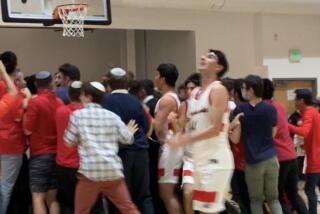Despite Danger, House Parties Still Attract Athletes
House parties.
You know the ones. A bunch of teen-agers cram into a small house. Music blasts the curtains out the windows. Guys scam on girls. Girls flirt with guys. They’re all doing their thang.
Then the police arrive to break it up because the neighbors want to get some sleep.
That’s the way Marques Johnson remembers house parties when he was a high school senior at Crenshaw in 1973.
“Yeah, I used to go to them all the time,” said Johnson, a former NBA and UCLA basketball player. “They were on the cusp of being dangerous. There were only a few isolated cases where there was gunfire.”
But times have changed.
The shooting death of Washington High basketball player Antonio Lewis at an April 30 party in Gardena has made apparent the increasing dangers of house parties to athletes who have promising college and professional futures.
“I don’t want my kid out of the house,” said the father of a Gardena Serra basketball player. “I told his mother, ‘He can go to the prom and that’s it.’ It’s been a sore subject since I read the story about Lewis.”
Johnson said he lets his son, Crenshaw senior forward Kristaan Johnson, make his own decisions about parties.
“I feel very uneasy about house parties,” Johnson said. “I ask him, ‘Where is it? Who is giving it? And who is going to be there?’ When he was a junior last year, I told him a couple times he could not go to certain house parties. Now, he’s 18 and pretty responsible. I talk to him a lot because it’s one venue where someone can get hurt.”
“There are always people who want to get in and they’re not invited,” Crenshaw football Coach Robert Garrett said. Often the intruders are gang members who are met by opposing gang members. “They leave and say, ‘We’re going to come back and show you,’ ” he said.
Fremont basketball player Calvin Patterson said that most athletes are not associated with gangs. “Everyone is trying to get out of (the inner city) and make something of themselves,” he said.
But that doesn’t mean athletes can avoid the line of fire.
“I advise my kids not to go to house parties,” Garrett said. “But there are no set team rules against them. I beg and plead, but kids still go.”
Some of the athletes themselves have become more apprehensive about house parties.
“I try not to go to too many, because fights and violence break up the parties,” said Manual Arts senior forward David Rickenbacker. “There is always somebody who has a personal beef with someone else or somebody who has a bad attitude and a chip on his shoulder. You look at him wrong and something happens.
“I will still go, but I’m more aware of the situation around me.”
Fremont basketball player Calvin Patterson said his mother forbids him to attend house parties.
“No, not me,” he said. “I stay home and watch TV. It’s cool. The next two or three days later, I hear about them and I’m glad I didn’t go. I just come to school and play some ball and that’s it.”
Washington High star Dayron Harris’ mother also voiced her objections.
“My kids haven’t attended house parties since junior high school,” said Bobbi Harris, a mother of five. “People see you’re from a different neighborhood and if they don’t approve, they get violent. It makes me nervous to have teen-agers. It’s sad you can’t go from one neighborhood to another. Most of the time the innocent get hurt, and that’s not fair.”
“Teen-agers want to be accepted by their peers,” Washington basketball Coach Andy Davis said. “You can’t be a prisoner in your own neighborhood. You can’t isolate yourself from all your friends and not go to functions. A teen-ager needs to have a social life.
“They can’t go to the movies. They can’t go to the malls because something might happen. And they can’t sit around the house and look at television all the time. They have to venture out sometimes. I know I’m not the only person searching for a solution.”
Sylvia Collins, Washington’s tennis coach, offered one alternative: “I tell my boys and girls to stay home and play their music real loud. It’s the same thing as being at a house party.”
More to Read
Get our high school sports newsletter
Prep Rally is devoted to the SoCal high school sports experience, bringing you scores, stories and a behind-the-scenes look at what makes prep sports so popular.
You may occasionally receive promotional content from the Los Angeles Times.






